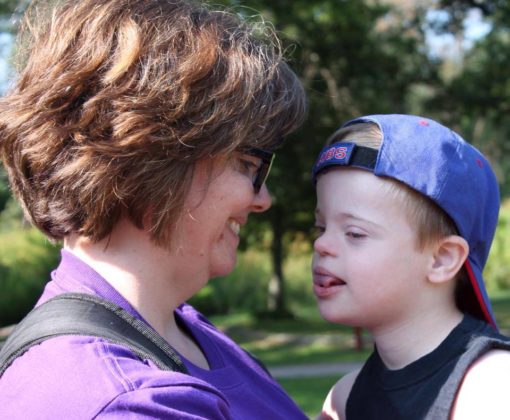More loyal than loving, I am deeply connected to my family and friends, but I am not your stereotypical “nurturing mother.” In a society where women are expected to be emotional and loving, I am analytical and often distant.
Sometimes I wonder if my brain is missing a chip. The other day my son Bobby and I were walking down the stairs at his school and a little boy tripped at our feet.
“I’m OK,” the boy hastily assured me, as if he feared I might make a big show of his accident.
“Kid,” I thought, “I’m not that kind of mother. Unless you’re bleeding or a bone is poking out, I am not likely to stop.”
As I walked away, I realized that I’d been so busy with the thoughts in my head that I hadn’t spoken a word of comfort about the fall. That kind of caring reaction doesn’t come naturally to me.
I notice a similar disengagement on my part when I walk our dog Butter. Many of the fellow dog owners on our street know Butter’s name and stop to pet my friendly yellow lab. I make polite small talk, but have no interest in engaging with someone else’s dog.
I’m not an endless fountain of maternal affection. More loyal than loving, I am deeply connected to my family and friends, but I am not your stereotypical “nurturing mother.” In a society where women are expected to be emotional and loving, I am analytical and often distant. The dichotomy never bothered me before my son came along, but I was very self conscious of my nature once Bobby was born.
Back then, I quickly lost myself in the details of caring for a newborn. Bobby had a serious heart defect that required three open heart surgeries by the age of 3. I lived at the hospital with him, talking to the doctors and nurses, entertaining him on the days he felt well enough to play, holding him for hours on the days he did not. But emotionally, I detached.
I didn’t cry when I handed Bobby over to the surgeons. I didn’t want to scare my boy any more than the scrubs and masks already did.
When doctors told us that Bobby was not recovering well after his second heart surgery I did not come undone at the thought of him dying. I focused on the treatment in front of us.
When he needed to be restrained for a procedure, I held him as he screamed, less focused on his reaction than on the fact that we would do whatever it took to cure him.
On the surface, I looked like a fierce mama bear protecting my son during scary times, but deep down I worried about the detachment I felt. I wanted to feel something akin to a blazing love in my heart for the boy, but my analytical nature dominated my mothering. I worried I was just another caregiver.
Then one early morning I awoke in a chair next to my son’s hospital bed to see the nurse taking morning vitals. Without warning, the heart monitor alarmed and the nurse called for the cardiac team. The room immediately filled up with a dozen medical staff pushing medication carts and holding cardiac paddles.
I stood outside, my legs shaking so violently someone pushed me into a chair. Bobby stabilized quickly and the doctor called for me. I walked through the crowd of medical personnel, past the equipment, and stood by my terrified, screaming son.
“We need you to calm him down,” the doctor said.
I held his hand, gently speaking his name, promising him that he was OK. He looked at me, tears running down his face.
And he settled to my voice.
I never worried that I was just another caregiver again. In a room full of the best medical minds and technology available, I was the one my son needed. I realized that those hours I had spent at his side, wondering if my love was warm enough, had taught my son that when the world turns to chaos, I will keep him safe. I may detach myself from the emotions of the moment, but not from him.
That is nurturing. That is love.
My son is now 8 years old. I no longer worry that I do not meet the cultural standard of the emotional and empathetic mother. I am an analytical parent—my relationship with Bobby is based upon a lot of deliberate consideration of what he needs in his life. I am constantly critiquing and adapting my style.
That may sound sterile, but it isn’t. There is plenty of time left over for hugs and “I love yous.” And when I tell Bobby I love him, I say it with the confidence that I am using my strongest attributes to be the best parent I can be instead of wasting my energy worrying about the kind of mother society says I should be.
Anne Penniston Grunsted writes about parenting, disability, and family life from her perspective as a lesbian mama. She has been published in The Washington Post, Brain, Child Magazine, Mamamia, and won the 2014 Nonfiction prize from Beecher’s Magazine. She lives in Chicago with her partner and son.
Photo courtesy of the author
Other Links:

